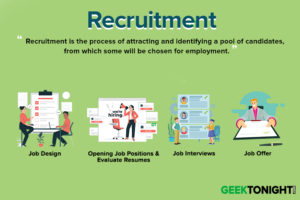What is Career Planning?
Career planning is a technique implemented at the managerial level for mapping the complete career of any individual or young employee (working in his/her initial stages of career). It mainly emphasises on assisting the employees in aligning the personal goals with the organisational goals so that they can realise the opportunities available in the organisation.
Career planning is not an event or end in itself, but a continuous process to develop employees for optimum results. Organisations should help employees in career planning so that both can satisfy each other’s needs.
Table of Content
Figure depicts some popular definitions of career planning by renowned authors:
Every individual wants to grow and attain new heights of knowledge, experience, and career development prospects at his/her work place. Presence of future career prospects in an organisation enables every individual to enrich his/her potentials fully. An employee feels motivated when the organisation shows him/her a clear path for attaining the personal goals along with the corporate goals.
The actual need for career planning arises after employees have contributed long years in a particular organisation and do not see any growth. These employees get demotivated and try for alternative options. Lack of career plan may lead to high costs, as selecting new employees would mean additional cost on selection and training programmes. Therefore, organisations should have a career plan and educate key employees about the opportunities that exist internally for them.
Objectives of Career Planning
Career planning is done to achieve the following objectives:
- Attract and retain competent and talented workforce by offering careers, not only jobs
- Use workforce effectively and efficiently to achieve more productivity
- Reduce the employee turnover
- Improve the morale and motivation of employees
- Meet the current and future requirements of the organisation for human resource on a timely basis
- Rectify previous mistakes in employee placement
Process of Career Planning
Career planning is a systematic process. Figure shows the steps of the career planning process:
Identify Individual Needs and Goals
Career planning starts by reorganising the career goals of employees. Most employees do not have clear objectives, anchors, and goals regarding their careers. Therefore, the HR professionals of an organisation must facilitate employees in career planning by providing them as much information as possible. They should consider the skills, experience, and attitude of employees and advise them on what kind of work would suit them.
The HR professionals assist employees though workshops or seminars where the employees undergo through various psychological tests and simulation exercises. These exercises guide employees on how to build and advance their careers within an organisation. These workshops and seminars may increase employees’ interest in career planning by helping them to establish career goals, identify career paths, and reveal specific career development activities.
Analyse Career Opportunities
After identifying their career aspirations, employees examine the career paths available to them. Career paths show the possibilities of career progression. They indicate the various positions that employees can hold over a period if they perform well. Career paths change with time according to employees’ and organisation’s requirements. While defining career paths of employees, the HR professionals should properly balance the privileges of experienced employees without professional degrees and inexperienced employees with excellent degrees.
Align Needs and Opportunities
In this step, the HR professionals highlight and align the gaps between the employees’ needs and opportunities provided by the organisation.
This step consists of two sub-steps:
- Identify the potential of employees: To do this, the HR professionals can access performance appraisal, which reveals the need for further training of employees.
- Undertake the career development programmes: After identifying the potential of employees, the HR professional undertake certain development techniques to upgrade the knowledge and skills of employees.
These development techniques include special assignments, planned position rotation, supervisory coaching, job enrichment, and understudy programmes. The HR professional do this to align the employees’ needs and organisational opportunities.
Formulate Action Plans and Perform Periodic Review
After starting the former steps, the employees and HR professional should periodically review the entire career plan and its implementation.
These action plans help the employees to determine:
- Direction of their career paths
- Changes required in their careers
- Skills needed to face new and emerging organisational challenges
These actions plans help the organisations to find:
- How employees are doing
- What are their goals and aspirations
- Whether the career paths are in tune with individual needs and serve the overall corporate objectives
Benefits of Career Planning
Effective career planning provides the following benefits to an organisation and its employees:
- Helps the organisation to identify the talented and competent employees who can be promoted
- Enables the organisation to build a better image in the market, which helps it to attract and retain competent people
- Inspires employees to realise their career opportunities
- Facilitates employees in selecting the careers according to their lifestyle, preference, family culture, and scope for self-development
- Motivates employees and improves their morale, which results in increased job satisfaction by means of internal promotions and transfers
- Reduces the rate of employee absenteeism within the organisation, as the employees are assured about their career growth within the organisation. Therefore, they prefer to wait for their turn of promotion instead of changing the organisation
- Improves the job performance of employees by tapping their potential abilities and stimulating their personal growth
- Contributes towards the individual and organisational development and effective achievement of the corporate goals
Limitations of Career Planning
There are also certain limitations to career planning, which are as follows:
- Availability of opportunities for vertical mobility: The availability of opportunities makes the career planning realistic. Therefore, career planning is not suitable and appropriate for small organisations.
- Changes in environmental factors: These changes affect the business of the organisation and industry. In developing countries, such as India, the governmental policies change frequently. Therefore, career planning for a longer period of time may not be effective.
- Existence of prejudices and interventions: Prejudices and interventions make it difficult to plan career systematically. For instance, favouritism and nepotism in promotions and political intervention in appointments affect career planning.
- Lack of scope in some jobs: Lack of scope of further growth reduces the career advancements of individuals because they cannot get promotion despite the required skills and effective career planning.
- Decline in career opportunities: This decline results from the influence of technological or economic factors in certain job categories. For instance, computerisation declined the career opportunities for statisticians. The solution for the decline in career opportunities is career shift.
- Complication of the career issues: This complication occurs when there is an improper alignment of career issues and life stages of employees and their families. For example, if a 50-year-old employee is assigned a job of sales representative, he/she would not be able to perform the assigned job efficiently as compared to 21- year old employee, who has more stamina and enthusiasm.
This is an example of mismatch between career issues and life stage of an employee. Changing needs of employees throughout their lifecycle also complicate career issues.
Human Resources Tutorial
(Click on Topic to Read)





